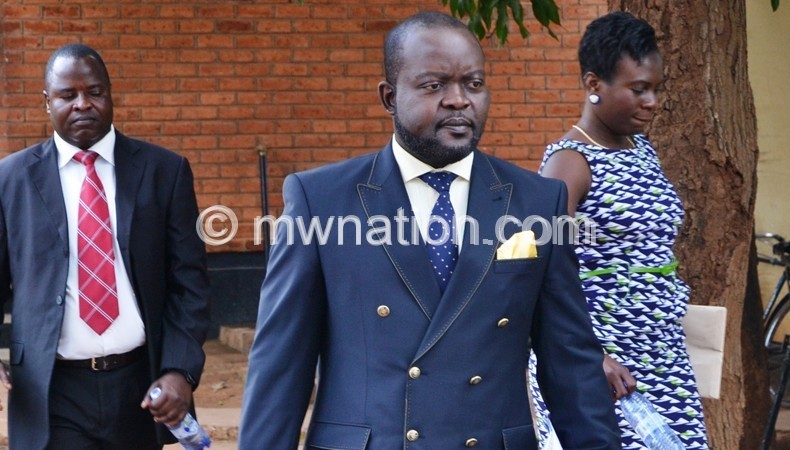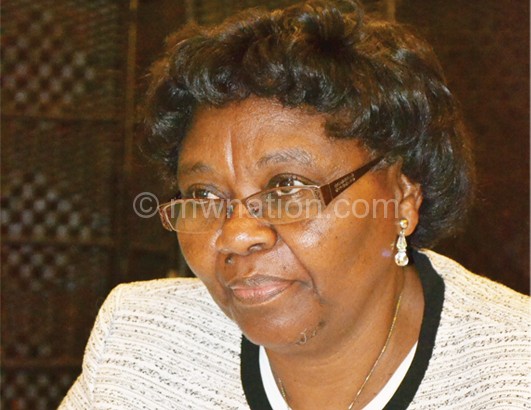Mphwiyo queries judge’s contract
Former budget director at the Ministry of Finance Paul Mphwiyo and 14 other accused persons in the infamous Cashgate case have demanded proof of contract extension for the judge presiding over their case, Esmie Chombo.
The 15, accused of defrauding K2.4 billion public funds in 2013, have also asked the Judiciary, in a letter dated January 29 2021, the rationale of continuing with the hearing where the court is being crammed with over 20 people at a time Covid-19 pandemic has hit hard.

The accused persons, in their letter to registrar of the High Court and Malawi Supreme Court of Appeal, said they are making the request under the Access to Information Act as interested and affected persons.
I an interview on Friday Judiciary registrar Gladys Gondwe, in confirmed receipt of the letter, adding that she acknowledged receipt of it to the accused on February 1 2021.
The accused persons, insinuating that Chombo had her contract expired as a judge, demand in their letter to know whether the President permitted the extension of her contract, and if so, when?

The team, which judge Chombo found had a case to answer and are defending, demand a copy of the President’s permit as all presidential decisions must be in writing as stated by the Constitution.
“(We also demand) a copy of minutes of meeting of the Judicial Service Commission where such an extension was made or were deliberated and consultations made with the then President (Peter Mutharika),” they write.
The accused persons further demand a copy of the gazette of the said extension, arguing their understanding was that the judge was specifically being appointed after her tenure, and as such, the appointment ought to be gazetted.
They also demanded to get their response before February 2 2021—before they consider their next course of action.
The accused persons earlier in the letter complain that their trial was continuing in disregard of Covid-19 guidelines the Judiciary put in place, with the case running from 8.30 am to 4.30 pm in a room that holds over 20 people each day for weeks.
“When we made enquiries as to cause of such setting, which we still regard as a threat to our lives, consideration being made of the likelihood of death for people in our age group, many of whom have underlying conditions such as diabetes, high blood pressure and the like, we learnt that the honourable judge is pushing towards a target of concluding the case by June 30 2021 as that is the date the Chief Justice extended her tenure to.
“We are mindful of Section 119 of the Constitution and to help us navigate the issue, herein as we have to choose between being alive and being in contempt of court, if you can call this a choice at all…,” they wrote and went on to make their demands.
Section 119(1) of the Constitution reads: “Subject to this section, a person holding the office of judge shall vacate the office on attaining the age prescribed in subsection (6).
“Provided that the President, after consultation with the Judicial Service Commission, may permit a judge who has attained that age (65) to continue in office for such period as may be necessary to enable him to deliver judgement or to do any other thing in relation to proceedings that were commenced before him before he attained that age.”
The other accused persons in the case of embezzling the K2.4 billion, conspiracy to defraud government, holding property of government, theft and money laundering are David Bill Kandoje, Auzius Kazombo Mwale, Clemence Madzi, Roosevelt Ndovi, George N. Banda, Steve Likhuya Phiri, Michael Mphatso, Samuel Mzanda, Stanford Mpoola, Syphathy Chisale, Fatch Chiungano, Andrews Chilalika, Cecilia Ng’ambi and Ndaona Satema.
Mphwiyo was shot at the gate of his Area 43 residence in Lilongwe on September 13 2013 during the administration of Joyce Banda.
Former minister of Justice and Constitutional Affairs under the Joyce Banda administration, Ralph Kasambara, businessperson Pika Manondo, Dauka Manondo, Robert Kadzuwa and McDonald Kumwembe were convicted and jailed on Mphwiyo’s attempted murder.
Kasambara was, however, released on bail from prison after he applied and fought for it pending appeal in the Supreme Court of his conviction and sentence.
Mphwiyo’s shooting opened a can of worms of what widely came to be known as Cashgate—the plundering of public funds at the seat of government, Capital Hill.
Banda, as president then, ordered a forensic audit which was undertaken by a British firm between April and September 2013.
The audit established that K24 billion was siphoned through dubious payments and inflated invoices or services never rendered.
In May 2015, a financial analysis report by audit and business advisory firm, PriceWaterhouseCoopers also established that K577 billion public funds could not be reconciled, but the figure was later on reduced to K236 billion by another British forensic audit firm.





